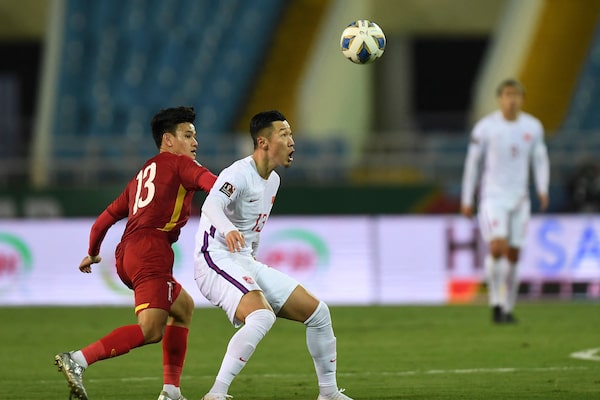
China's Xu Xin, right, and Vietnam's Ho Tan Tai fight for the ball during a World Cup qualifying match at My Dinh National Stadium, in Hanoi, on Feb. 1.NHAC NGUYEN/AFP/Getty Images
The opening ceremony of the Beijing 2022 Olympics is just days away, and China is geared up for what promises to be the country’s best-ever showing at the Winter Games. But when it comes to this year’s other global sporting event, China won’t even be in attendance: Its soccer team was knocked out of the World Cup after a humiliating 3-1 loss Tuesday to Vietnam in Hanoi.
The last and only time China qualified for the World Cup was in 2002. Ahead of Tuesday’s game, the team was already last in its group, and qualification would have taken something of a miracle. But defeat to Vietnam – a team that lost its past seven games and was 20 spots behind China in the FIFA world rankings – was tough to stomach for Chinese soccer fans. Many took to social media to vent, with one calling the loss “another night of shame.”
In a commentary, the People’s Daily, a mouthpiece of the Chinese Communist Party, said the game was one the team “shouldn’t have lost and couldn’t afford to.” The defeat should be a “watershed” moment, the paper said, “a turning point for China’s national team.”
What to watch at the Beijing Olympics: Everything you need to know about the 2022 Winter Games
Such a turning point has been a long time coming, however, and previous defeats – just as embarrassing as Tuesday night’s – have failed to spark a major transformation.
For a decade now, since soccer fan Xi Jinping became President, China has invested heavily in trying to become a soccer world power – without any payoff. A plan launched in 2015 saw the men’s team becoming among the best in Asia, and the women’s team among the best in the world, by 2025. Three years out, the women’s team is 19th in the world rankings, behind regional rivals North Korea, Australia and Japan, while the men’s side is 74th, one behind Cape Verde, a country of fewer than 500,000 people with 0.01 per cent the GDP of China’s.
Other countries without a strong soccer history have struggled at the men’s game – just ask the United States – but have not made success in the game such a public and repeatedly stated goal, nor thrown so much money at it.
China has spent billions on soccer, building pitches across the country – roughly 26,000 between 2016 and 2020 alone – setting up soccer academies modelled on those in Spain and Britain, securing the broadcasting rights to top international competitions and pumping money into the Chinese Super League, whose clubs were once among the top spenders in the world, snapping up global talent such as Carlos Tevez, Oscar and Hulk.
But all has been for naught. After years of fat spending in the CSL, the bills have started to come due, and many teams have found themselves in dire financial straits. Jiangsu FC won the league championship in 2020, only to be dissolved three months later when parent company Suning struggled to pay off debts. Former AFC Champions League winner Guangzhou FC is also teetering on the edge of bankruptcy because of problems with its owner, troubled real estate developer Evergrande.
The CSL has also struggled because of constant meddling by authorities, who sometimes view the league as a key step to building a successful national team – and, at other times, a distraction and obstacle to that goal. The league was paused from August to December last year so national team members could focus on World Cup qualifiers, to the outrage of fans and the detriment of clubs that were already struggling as a result of pandemic restrictions.
“The league, the clubs, the support base. These are what drive football anywhere and what ultimately deliver successful national teams. So what’s different in China?” Cameron Wilson, the founder of Wild East Football, a news and analysis site that covers soccer in the country, wrote in December. “Damningly, a Soviet sports mentality persists in the form of the Chinese FA’s tunnel vision on the national team, to the detriment of all else.”
China can invest in soccer education as much as it wants, but without a functioning domestic league, up-and-coming young players are left without clear prospects or direction, Mr. Wilson argued.
Hopes the authorities might change their approach are scant. In recent years, power in China has become even more centralized, the authorities ever more hands-on. The top-down approach has worked in other areas: After Beijing was awarded the 2022 Olympics, China declared it would become a winter sports powerhouse – and it seems to have done so. According to state media, about 300 million people have engaged in winter sports ahead of the Games, and Chinese athletes appear poised to deliver their country’s most successful performance ever at a Winter Olympics.
For the country’s beleaguered soccer fans, that’s just extra salt in the wound. Writing on Weibo, user Kangmixiu said they were watching a documentary on the Winter Olympics and “felt the motherland’s growing sporting power.”
“A few minutes later, when I changed the channel, I saw the national football team trailing Vietnam 0-2 …”
Alexandra Li and Nathan VanderKlippe contributed reports.
Our Olympic team will be writing a daily newsletter to land in your inbox every morning during the Games. Sign up today to join us in keeping up with medals, events and other news.
 James Griffiths
James Griffiths